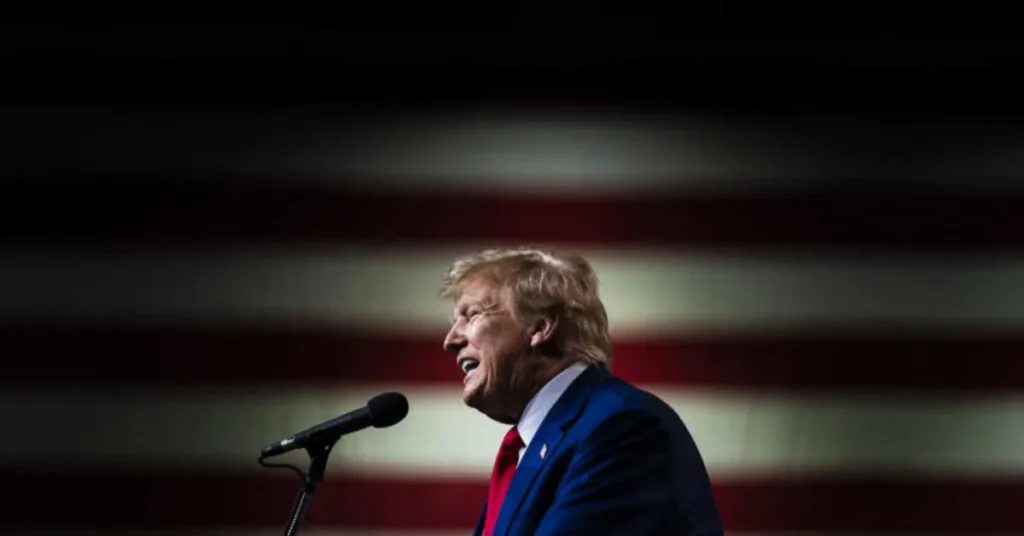Mike Lindell, the prominent figure known for his pillow business, has heavily promoted the unproven assertion that the 2020 election was stolen from Donald Trump. However, cybersecurity experts, government officials, and various courts have overwhelmingly rejected these claims. In a recent podcast with former Trump adviser Stephen K. Bannon, Lindell, in an attempt to affirm his conspiracy theory, joyfully removed a baseball cap covered in aluminum foil, claiming a federal judge had validated his stance. Contrary to his belief, the judge made no reference to Lindell or the baseless election-fraud allegations put forward by him and other Trump allies.
The judge’s acknowledgment of individuals not being labeled “conspiracy theorists” pertains to left-leaning plaintiffs in a pre-2020 election lawsuit set for trial. They argue that Georgia’s voting machines possess security risks that state officials must address as a constitutional obligation. Judge Amy Totenberg has highlighted the lawsuit’s support from eminent cybersecurity experts and computer scientists.
A potential verdict favoring the plaintiffs could have significant implications. It may imply vulnerabilities in Georgia’s voting machines, pivotal in the 2020 presidential election. However, despite intending to fortify election security, such a judgment might be misconstrued to cast doubt on election integrity.
Members of the MAGA movement, including Trump, have long sought to utilize this case to reinforce the false narrative of manipulated voting machines favoring Joe Biden. As the trial nears, Trump allies position themselves to gain political leverage from any ruling questioning the machines’ security.
Expressing concern, Edward Perez, former Twitter director for civic integrity and OSET Institute board member, fears that any legal affirmation of voting technology vulnerabilities might be exploited to undermine public trust in elections for political gains.

The plaintiffs argue that Georgia’s touch-screen voting computers are susceptible to attacks and human error but do not claim past exploitation of these alleged vulnerabilities. They emphasize an incident involving unauthorized copying of voting software by Trump allies in 2021, heightening potential risks to future elections.
Despite efforts to distort the case’s nature, Marilyn Marks, executive director of the Coalition for Good Governance, underscores the necessity of addressing Georgia’s voting system issues, regardless of political influence.
Georgia’s Secretary of State, Brad Raffensperger, a Republican known for defending the 2020 election results against Trump’s challenges, asserts that existing security protocols ensure the voting system’s safety and accuracy. His office contends that without evidence of malware or hacking, the plaintiffs’ claims lack substantiation.
Notably, Dominion Voting Systems, the manufacturer of Georgia’s machines, refutes conspiracy theories related to the 2020 election, stating any exploitation of machine vulnerabilities would be operationally unfeasible. However, the company is not involved in the Curling lawsuit.
The impending bench trial, presided over by Judge Totenberg, an Obama appointee, is expected to last weeks. She cannot mandate the adoption of hand-marked paper ballots but might recommend new security measures if deficiencies in the current system are found.
The Curling case represents a rare challenge to existing voting machines, backed by substantial evidence, and stands as a significant legal confrontation. Originating in 2017 against then-Secretary of State Brian Kemp (R), the lawsuit contested Georgia’s paperless touch-screen voting machines lacking a paper trail to verify votes accurately.
In 2019, Judge Totenberg ordered the cessation of these machines’ usage, citing genuine threats to voters’ rights. Subsequently, Georgia adopted Dominion’s ballot-marking devices (BMDs) for all in-person voting statewide, becoming the sole state to do so.
As the trial unfolds, the plaintiffs persist in arguing that the new voting system remains insecure, contesting its reliability in accurately recording votes. Despite Totenberg’s prior decision not to block the usage of these machines, she cautioned about genuine risks concerning hacking or system failures.
The Curling case became a focal point for Trump’s allies post-election, seeking to bolster his claims and retain his hold on power.
Following the 2020 elections, Sidney Powell, a pro-Trump lawyer, referenced expert testimony from the Curling case in her lawsuits aiming to reverse Trump’s defeat in Georgia and three other states. Powell’s legal complaints highlighted an expert declaration and an academic paper submitted in Curling, underscoring alleged issues with ballot-marking devices. These lawsuits merged this evidence with baseless claims, suggesting involvement of foreign entities such as Iran, China, and Venezuelan communists in rigging voting machines.
In December of that year, concerns raised by Judge Totenberg about the machines’ potential risks were mentioned in a proposed executive order crafted by a group of Trump supporters. This proposal suggested the seizure of voting machines, an idea that Powell and former national security adviser Michael Flynn reportedly presented to Trump before the January 6 Capitol attack.
Trump and his allies also seized upon a report authored by Halderman, a witness for the plaintiffs in Curling. Totenberg granted Halderman access to Dominion ballot-marking devices and related equipment. His sealed report from the summer of 2021 detailed “critical vulnerabilities” that could compromise the machines’ security measures.
Lindell attempted to push for the release of this report, claiming it would aid his defense against Dominion’s defamation lawsuit. Multiple media outlets facing similar legal action also sought to unseal the report. Initially, Totenberg declined, citing the lack of correlation between Dominion’s defamation suits and the technical aspects discussed in Dr. Halderman’s report.
The report was eventually unsealed and became pivotal in the argument over whether the case deserved a trial. Trump shared a link to a story about the report on Truth Social, blurring the lines between evidence of vulnerabilities and proof of their exploitation.
Lindell interpreted the report as vindication for those alleging the 2020 election was rigged. However, Halderman, while finding no evidence of election interference, outlined potential scenarios for installing malware on machines and manipulating votes.
Halderman’s findings demonstrated how hackers could manipulate votes by altering QR codes or both QR codes and text. The discrepancy between the text verified by voters and the encoded QR codes posed a challenge in confirming ballot accuracy.
Georgia’s recount in 2020 employed both machine rescanning of QR codes and manual hand counts of text, reaffirming Biden’s victory in both counts and asserting the accuracy of Dominion machines.
Plaintiffs in Curling emphasized that most voters do not verify the printed ballot against their choices, making a recount of unreliable ballots equally unreliable.
In 2022, the judge permitted Halderman’s report to be shared with the federal Cybersecurity and Infrastructure Security Agency (CISA). CISA acknowledged several vulnerabilities identified by Halderman in Dominion ballot-marking devices used across more than a dozen states besides Georgia.
CISA highlighted that exploiting these vulnerabilities would likely demand physical access to the machines. Raffensperger’s office confirmed established election-security protocols that would make accessing the machines extremely challenging for any malicious actor.
However, in January 2021, an elections official in Coffee County allowed a forensics team hired by Powell to copy virtually every part of the Dominion system. Halderman warned that this incident significantly increased the risk of an election attack in Georgia.
Totenberg’s ruling, citing evidence of substantial risks posed by Georgia’s voting machines, led to Lindell’s tinfoil hat gesture on Bannon’s podcast. Lindell clarified it wasn’t about the judge’s ruling on the 2020 election but rather emphasized the need for scrutiny of the machines.
Other individuals contesting the 2020 election’s legitimacy also embraced the judge’s ruling, complicating support for the Curling plaintiffs among Democrats. Post-2020, Democrats, previously concerned about election security, fear being labeled as election deniers.
Some Democrats, like Jasmine Clark, formerly critical of the machines, find it challenging to express concerns without aligning with Trump-linked theories. The breach in Coffee County’s elections office intensified worries about access to the state’s voting software, creating a dilemma between bolstering election confidence and avoiding association with election deniers.
Also Read- Inside Ohio’s Democratic Stronghold: Political Drama, Surprising Twists, and Potential Upsets Await!

